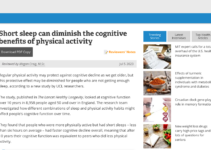Sleep plays a crucial role in maintaining overall health and well-being. It is a vital process that allows the body to rest, repair, and rejuvenate.[0] However, in today's fast-paced and demanding world, many individuals suffer from sleep deprivation and poor sleep quality. This can have detrimental effects on both physical and mental health.[1]
A study conducted by researchers at the University of York has shed light on the importance of high-quality sleep and coping strategies in preventing poor mental health. The study aimed to investigate the relationship between coping strategies, sleep quality, and mental health outcomes, particularly in individuals experiencing chronic stress.
Chronic stress is a major risk factor for mental health disorders such as depression and anxiety.[1] The researchers hypothesized that positive coping strategies and good sleep quality could help mitigate these risks. They analyzed data from the Boston College Daily Sleep and Well-being Survey, where participants self-reported their sleep quality and mental well-being during the COVID-19 pandemic.[1]
The findings of the study revealed that high-quality sleep and positive coping strategies can contribute to better mental health outcomes. The ability to reframe a situation and focus on the positive aspects, combined with good sleep, can prevent the development of depression and anxiety. This highlights the importance of addressing both sleep quality and coping strategies when dealing with chronic stress.
Dr. Scott Cairney, a supervisor on the project, stated that while the benefits of high-quality sleep on health and well-being have been known for a long time, this study further emphasizes the significance of sleep and coping strategies during periods of intense and prolonged stress, such as the COVID-19 pandemic.[1]
Furthermore, the study also examined the impact of sleep and physical activity on cognitive function. Previous research had primarily focused on the snapshot relationship between sleep, physical activity, and cognitive health. However, this study revealed that regular physical activity alone may not be sufficient to counteract the long-term effects of sleep deprivation on cognitive health. Adequate sleep is essential to reap the full cognitive benefits of physical activity.
The study's findings have important implications for healthcare professionals and individuals alike. It emphasizes the need to prioritize sleep and develop positive coping strategies to promote mental health and overall well-being. The World Health Organization already recognizes physical activity as a way to maintain cognitive function, but interventions should also consider sleep habits to maximize long-term benefits for cognitive health.
Sleep deprivation has been linked to various health problems, including heart disease, high blood pressure, obesity, depression, and impaired cognitive function.[0] It is crucial to prioritize and prioritize adequate sleep to maintain optimal health. Simple sleep habits, such as setting a consistent sleep schedule, creating a relaxing bedroom environment, and avoiding electronic devices before bedtime, can significantly improve sleep quality.
In an aging society, it is essential to ensure adequate sleep and improve sleep quality to prevent health issues such as obesity and dementia. Individual efforts, as well as social support, are necessary to address sleep-related problems comprehensively.[2]
In conclusion, sleep is a fundamental aspect of maintaining good health and well-being. The study conducted by the University of York highlights the importance of high-quality sleep and positive coping strategies in preventing mental health disorders. It also emphasizes the need to consider sleep and physical activity together for optimal cognitive health.[3] By prioritizing sleep and adopting healthy sleep habits, individuals can enhance their overall well-being and prevent the onset of various health problems.
0. “Trouble Sleeping? Tips For a Restful Sleep When Going Through …” www.texasoncology.com, 21 Aug. 2023, https://www.texasoncology.com/Who-We-Are/Media-Center/In-The-News/News-Articles/2023/July/Trouble-Sleeping-Tips-For-a-Restful-Sleep-When-Going-Through-Cancer-Treatment
1. “Got the blues? Study says you should get a good night's sleep …” www.news-daily.com, 21 Aug. 2023, https://www.news-daily.com/local/health/got-the-blues-study-says-you-should-get-a-good-night-s-sleep/article_61ff2cdb-3733-534d-a398-a5c8dce362e0.html
2. “Cultural and individual factors influence sleep quantity and quality” www.news-medical.net, 21 Aug. 2023, https://www.news-medical.net/news/20230718/Cultural-and-individual-factors-influence-sleep-quantity-and-quality.aspx
3. “Short sleep can diminish the cognitive benefits of physical activity” www.news-medical.net, 21 Aug. 2023, https://www.news-medical.net/news/20230705/Short-sleep-can-diminish-the-cognitive-benefits-of-physical-activity.aspx





